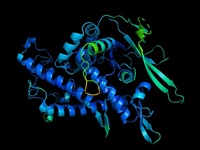
THEME: Teaching and learning with AI - Perspectives on the use of AI
Jacob Fredegaard Hansen is a data scientist at the Department of Biochemistry and Molecular Biology (BMB) at the Faculty of Science. SDUUP has asked Jacob about the potentials and challenges he sees in the use of artificial intelligence (AI).
Jacob thinks AI is wildly interesting and believes that SDU as an educational institution should be curious and open to the latest technologies and continuously work to implement them in our practice. However, he sees a particular challenge with AI, as it is such a radical new technology that it will change the way we work.
Jacob uses AI in his daily work as a data scientist at BMB. "When I encounter errors in my work with coding or get stuck in my code, I have previously used Google, which has taken me to various forums where I could find answers, but with the help of AI chatbots, such as chatGPT and Bing's chatbot, I can get answers faster. So if I get stuck in some code that doesn't work, I copy the code into the chatbot and ask it to suggest solutions – sometimes it works - sometimes not."
Jacob compares the process of designing the good queries/prompts for chatbots to a data analysis process and a conversation with a good friend.
"It's like analyzing data – garbage in/garbage out. You need to know how to communicate with the chatbot. It's like a good friend, where over time you build a good relationship. I think it's interesting and fun to play with AI chatbots to find out how I can exploit their potential."
Leon Furze conducts research in the field of AI in writing, instruction, and education. In a blog post he gives his take on how you can design the good prompts and "teach" your AI chatbot to provide a useful output:
- Be precise – the more detail and context, the greater the chances of more accurate answers
- Avoid the "efficiency trap" – break your general prompts down into edible bites
- Check the facts – ask about the sources behind the output
- Iterate and adjust through multiple iterations
- Use role-playing games – ask for example that Socrates gives his take on an answer
- Remind – stay focused
- Fill in the gaps
Read the blog post for an elaboration of the above and to see examples, where also the CREATE model is unfolded.
At IT-Torvet you will find similar advice on making good requests.
Tine Wirenfeldt Jensen, PhD in Learning and Education and owner of METodo, also gives presentations on the importance of ChatGPT and AI for teaching. In an article for the journal Gymnasieskolen (for high school teachers), she points out the benefits of working with the good prompts because it takes a lot of rhetorical reflection and skills to get ChatGPT to generate sensible responses.
Jacob believes that it could be a good idea to have workshops for both teachers and students, where they get the opportunity to explore the limits of when it makes sense to use AI chatbots and when it makes sense to be critical. "We learn very differently and have different preferences. AI can support learning in many ways, including helping students with special abilities who may have difficulty reading or hearing. It is important that we as an institution not only ban the use of AI chatbots, but also address their possibilities and the challenges we face in terms of implementing them in a responsible manner." Jacob has also experimented with the use of chatbots for reformulations of exam questions, job postings for recruiting students, etc.
 Jacob also explains that in the classes at the Faculty of Science the students use an AI-based app, AlphaFold, which can be used to predict 3D structures for proteins using deep learning models. One of SDU eScience Center's supercomputers helps train these models to be able to predict 3D structures for proteins more accurately and faster when handling large amounts of data. In this way, they can more quickly investigate the impact of various mutations that may create or cause a disease that would otherwise require long experimental experiments and instrumental setups.
Jacob also explains that in the classes at the Faculty of Science the students use an AI-based app, AlphaFold, which can be used to predict 3D structures for proteins using deep learning models. One of SDU eScience Center's supercomputers helps train these models to be able to predict 3D structures for proteins more accurately and faster when handling large amounts of data. In this way, they can more quickly investigate the impact of various mutations that may create or cause a disease that would otherwise require long experimental experiments and instrumental setups.
Jacob Fredegaard Hansen

Data scientist at the Department of Biochemistry and Molecular Biology (BMB) at the Faculty of Science, SDU.